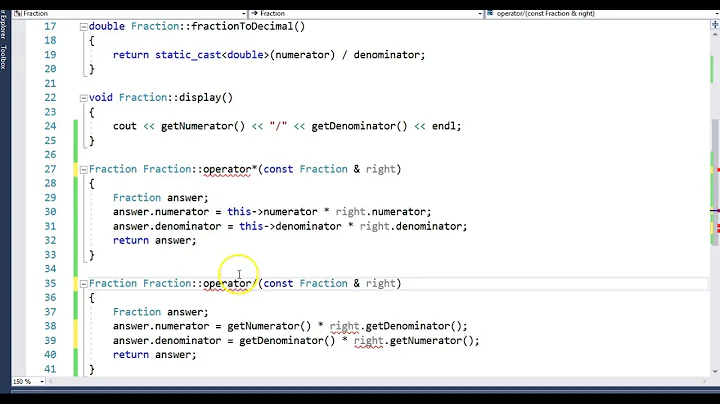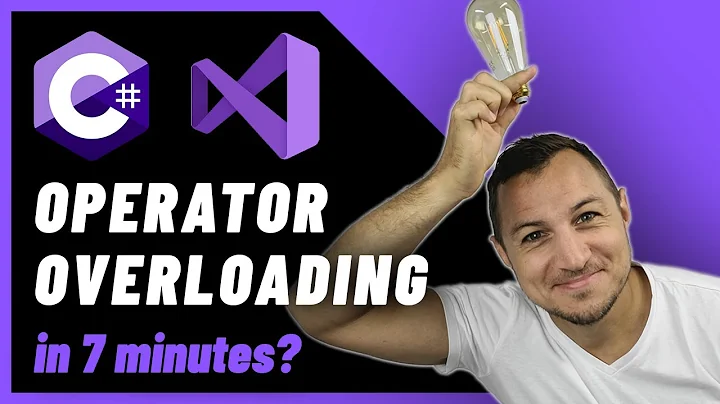Why isn't operator overloading for pointers allowed to work?
Solution 1
Because if it was allowed, then it would not look good, and wouldn't be as intuitive as its with reference.
Suppose it is allowed, then you would write:
struct A{};
A a, *pa, b;
a = pa ;//doesn't look good, also not intuitive. (not real C++)
It doesn't look good, because on left side you've non-pointer, on right side you've pointer. Looks very very weird. Also, since the types don't match, it doesn't look very intuitive as to what exactly its doing. I mean, you're assigning pointer to a non-pointer; what such an assignment is supposed to do? Copying the content of the address pointed to by pointer to the destination (non-pointer) is not very inttuitive.
On the other hand, as its allowed with reference (the reality, not a supposition):
a = b; //looks good, intuitive, as now both side is same type
With reference, you've both side same type, its only when b gets passed to operator=() as argument, it is passed by reference (or say by pointer, as references are syntactic sugar of pointers.) to avoid unnecessary copy, which in turn doesn't hinder performance, as it would if it is passed by value.
It would be also interesting to note that not only b is passed by reference (or pointer underneath), a also gets passed to the function by pointer, because we know in the function, the keyword this is actually a pointer.
So references were introduced in C++, to make whole thing look good and intuitive for programmers, otherwise they're pointers underneath. In fact, most compilers implement references using pointers (pointer-mechanism) internally.
Solution 2
Why doesn't it work for pointers? Because it's ambiguous. Would
ostream* operator<<(ostream* s, const char* c);
match
cout << 'a';
or
cout << "a";
?
Also, you can't use address-of (&) with a temporary. What should this do:
complex<double> a, b, c;
cout << a + b * c;
since b * c is a temporary, and the sum is also.
?
Solution 3
Operator overloading work on objects but pointer is not an object by itself. It points to an object.
Solution 4
With the plus operator overloaded for a heavy class, you would have to write either a + b (by-value, inefficient) or &a + &b (ugly and complicated) to add two objects of this class. But with references you get by-ref even when writing a + b.
Solution 5
Because most operators already have an alternate established meaning when applied to pointers.
Related videos on Youtube
cpuer
Updated on July 09, 2022Comments
-
cpuer almost 2 years
As per the comment under this answer, references were introduced primarily to support operator overloading which quotes Bjarne Stroustrup:
References were introduced primarily to support operator overloading. C passes every function argument by value, and where passing an object by value would be inefficient or inappropriate the user can pass a pointer. This strategy doesn’t work where operator overloading is used. In that case, notational convenience is essential so that a user cannot be expected to insert address− of operators if the objects are large.
Which implies that operator overloading can't work with pointer. But it doesn't clearly explain why operator overloading with pointers can't work. Why wouldn't operator overloading work for pointers?
IMO where references are used, pointers can also be used in its place.
-
cpuer almost 13 years@Christian Rau,
&a + &bis ugly but not complicated than reference. -
In silico almost 13 years@cpuer: Yes, but
a+bis a lot more intuitive than&a+&b1. -
cpuer almost 13 years@In silico ,So reference is just a more beautiful way to use pointers?
-
cpuer almost 13 years@Ben Voigt,I think it would match both.
-
 Ben Voigt almost 13 yearsWell, the compiler could pass the address of each operand.
Ben Voigt almost 13 yearsWell, the compiler could pass the address of each operand. -
Daniel almost 13 yearsIt shouldn't automatically take pointer, it won't match
cout << 'a';but it will matchcout << &'a';unless the compiler throws lvalue problem. in that case you can usechar a = 'a'; cout << &a; -
 Ben Voigt almost 13 years@cpuer: Then how would the operator know whether to print one character, or up to the first NUL element?
Ben Voigt almost 13 years@cpuer: Then how would the operator know whether to print one character, or up to the first NUL element? -
Benjamin Lindley almost 13 years@Ben Voigt: Then how would it be able to differentiate between two functions, one of which takes a pointer, and the other takes a value?
-
 Ben Voigt almost 13 years@Dani: Then how do you do pointer arithmetic? Does
Ben Voigt almost 13 years@Dani: Then how do you do pointer arithmetic? Doescomplex<double> a[4]; cout << a + 1;print the sum of the first element and one, or the second element? -
 Ben Voigt almost 13 yearsCircular reasoning. You can't cite the current set of rules as justification for the current set of rules. You need a rationale.
Ben Voigt almost 13 yearsCircular reasoning. You can't cite the current set of rules as justification for the current set of rules. You need a rationale. -
 Ben Voigt almost 13 yearsCircular reasoning, and not entirely true. Even under the current rules, only one operand needs to be a user-defined type.
Ben Voigt almost 13 yearsCircular reasoning, and not entirely true. Even under the current rules, only one operand needs to be a user-defined type. -
 Ben Voigt almost 13 yearsA problem I already highlighted in my answer. It would be feasible if the compiler always took the address of each operand, such that when an operand was a pointer, the implementation received a double pointer. But it would be confusing for sure.
Ben Voigt almost 13 yearsA problem I already highlighted in my answer. It would be feasible if the compiler always took the address of each operand, such that when an operand was a pointer, the implementation received a double pointer. But it would be confusing for sure. -
cpuer almost 13 years@Ben Voigt,in other words,it's because the ambiguity of c pointer syntax that cause references to be introduced?
-
 Ben Voigt almost 13 years@Dani: No, there could have been a language which, when the programmer wrote
Ben Voigt almost 13 years@Dani: No, there could have been a language which, when the programmer wrotea + b, transformed it tooperator+(&a, &b)if eitheraorbwas a user-defined type, andbuiltin+(a, b)otherwise. But you'd still have a problem with addresses of temporaries. -
 Ben Voigt almost 13 years@cpuer: C pointers aren't ambiguous, but having the compiler take the address for you would be confusing. So the solution (listen carefully) involves having the compiler take the address for you, but it then hides the fact that it's done so. Which definitely is not less confusing.
Ben Voigt almost 13 years@cpuer: C pointers aren't ambiguous, but having the compiler take the address for you would be confusing. So the solution (listen carefully) involves having the compiler take the address for you, but it then hides the fact that it's done so. Which definitely is not less confusing. -
 Ben Voigt almost 13 yearsSeems like that would call
Ben Voigt almost 13 yearsSeems like that would calloperator=(A*, A**). Which I think would be as rare asoperator=(A&, A*&)is today. -
Xeo almost 13 yearsAlso, by the language standard, a pointer is an object, in contrast to a reference, which isn't. :)
-
 Nawaz almost 13 years@Ben: I didn't understand what you're trying to say.
Nawaz almost 13 years@Ben: I didn't understand what you're trying to say. -
In silico almost 13 years@cpuer: Don't think of references as pointers (or some variant thereof), because they can't do pointer arithmetic, you can't "reseat" reference, and taking the address of a reference gets you the address of the object it refers to (instead of the reference itself). It's much more useful to think of references as aliases to the object it refers to (they may be implemented via pointers by the compiler, but that's an implementation detail). Any change that you perform on the alias changes the original object.
-
 Ben Voigt almost 13 years@Nawaz: In a hypothetical C++ developed in an alternate universe, where user-defined operators received pointers to their operand instead of a reference, your line of code
Ben Voigt almost 13 years@Nawaz: In a hypothetical C++ developed in an alternate universe, where user-defined operators received pointers to their operand instead of a reference, your line of codea = pa;, which has LHS of typestruct A, and RHS of typestruct A*, would receive a pointer to each, thusoperator=(struct A*, struct A**). Most people would defineoperator=(struct A*, struct A*), to enablea = b;. -
cpuer almost 13 years@Nawaz,I can understand your answer completely.@Ben Voigt,though I think your answer is also right,but haven't understood it yet...
-
John almost 13 yearsThe reason is very simple. If overloading built-in operators would be possible (like custom
int operator+(int, int)) then you would end up with inconsistent behaviour. Your code would use your operator and all other code (libraries) would use other (built-in) operator. -
Benjamin Lindley almost 13 years@Ben Voigt: But you're introducing the problem of ambiguity yourself when you say the compiler could pass the address of each operand. The solution to that problem is not to introduce it in the first place and have operands act just like regular function arguments. Then that leaves you with the problem that I point out.
-
 Nawaz almost 13 years@cpuer: I added one more paragraph at the end.
Nawaz almost 13 years@cpuer: I added one more paragraph at the end. -
 Ben Voigt almost 13 years@In silico: Every time I've heard references described as aliases (or "just another name for the variable"), people managed to confuse issues of lifetime. A reference is best thought of as a pointer with a pointer-dereference (
Ben Voigt almost 13 years@In silico: Every time I've heard references described as aliases (or "just another name for the variable"), people managed to confuse issues of lifetime. A reference is best thought of as a pointer with a pointer-dereference (*) permanently stuck on the front. -
cpuer almost 13 years@Nawaz ,aha,so my conclusion is right: reference is just a more beautiful way to use pointers:)
-
 Ben Voigt almost 13 yearsA double pointer is not ambiguous with a single pointer. But most new programmers don't understand double pointers even as well as references (and references not as well as pointers). Although that might have turned out differently in an alternate universe where C++ didn't have references.
Ben Voigt almost 13 yearsA double pointer is not ambiguous with a single pointer. But most new programmers don't understand double pointers even as well as references (and references not as well as pointers). Although that might have turned out differently in an alternate universe where C++ didn't have references. -
 Nawaz almost 13 years@cpuer: Exactly, my friend. References are permanently dereferenced pointers.
Nawaz almost 13 years@cpuer: Exactly, my friend. References are permanently dereferenced pointers. -
In silico almost 13 years@Ben Voigt: That's a good point. It's really meant to be more of an analogy than anything else, anyway. I like your description of how references work, but it doesn't explain why
constreferences extend the lifetime of temporaries but non-constreferences don't, which is obviously not how pointers behave. To be fair, it is an unusual case. -
 Ben Voigt almost 13 years@In silico: Lifetime extension of temporaries can't be explained by either approach... has to be learned as a special feature of references either way. What I'm wary of is the horrible explanation in the parashift FAQ. If a reference were the object, then the destructor would be called when the reference goes out of scope. But a reference bound to a non-temporary object does not destroy the object. The reference is bound, it is not itself a name for the object.
Ben Voigt almost 13 years@In silico: Lifetime extension of temporaries can't be explained by either approach... has to be learned as a special feature of references either way. What I'm wary of is the horrible explanation in the parashift FAQ. If a reference were the object, then the destructor would be called when the reference goes out of scope. But a reference bound to a non-temporary object does not destroy the object. The reference is bound, it is not itself a name for the object. -
In silico almost 13 years@Ben Voigt: I agree thinking of references as an object doesn't accurately reflect the lifetime of the object it refers to. It may be the exact way I explain it, but I the people I explained it to doesn't seem to be confused over object lifetimes with the "alias" analogy. When I explain it the example I used is that a person's nickname is an "alias" to the actual person. When you refer to someone by their nickname, you're actually referring to the original person (and of course nicknames do not affect the lifetime of the original person).
-
 Ben Voigt almost 13 years@In silico: But a reference isn't an alias for an object, like a pointer, it's an alias for the memory that object resides in. You can tell the difference, using placement new (carefully not deallocating the memory, which would result in undefined behavior) or a union.
Ben Voigt almost 13 years@In silico: But a reference isn't an alias for an object, like a pointer, it's an alias for the memory that object resides in. You can tell the difference, using placement new (carefully not deallocating the memory, which would result in undefined behavior) or a union. -
In silico almost 13 years@Ben Voigt: Yes there is a difference, but for all intents and purposes if I'm teaching someone who doesn't know the first thing about C++ references it's IMHO easier to think of the object and the memory it occupies as the same thing (a higher-level of abstraction, if you will). I never said that the "alias" concept was a perfect analogy without caveats.



![Overloading Special [ ] C++ Array Subscript Operator | Cpp Video Tutorial](https://i.ytimg.com/vi/pbxxtg3JQc8/hq720.jpg?sqp=-oaymwEcCNAFEJQDSFXyq4qpAw4IARUAAIhCGAFwAcABBg==&rs=AOn4CLAC38jBBLL-G9clWgwsqk7OWPSRQA)




